pdf [5.3MB] - Department of Families, Housing, Community Services
pdf [5.3MB] - Department of Families, Housing, Community Services
pdf [5.3MB] - Department of Families, Housing, Community Services
Create successful ePaper yourself
Turn your PDF publications into a flip-book with our unique Google optimized e-Paper software.
The following evidence <strong>of</strong> outcome achievement was reported based on parent evaluationsurveys collected after information sessions (AIFS, 2009b).Increased knowledge on school readiness: Two independent information sessionson school readiness were attended by 23 parents. Over half reported an improvementin their school readiness knowledge after the session.Increased knowledge <strong>of</strong> managing challenging behaviour: Two independentinformation sessions on management <strong>of</strong> challenging behaviour were attended by 35parents. Over two thirds reported an improvement in their knowledge <strong>of</strong> managingchallenging behaviours. The main theme arising from comments left by parents in thisarea was on improved awareness <strong>of</strong> addressing behaviour issues in a positive manner.Some parents also reported their improved awareness that positive behaviouralguidance was more useful than negative behavioural guidance in the management <strong>of</strong>challenging behaviours.3.3.2 INVEST TO GROWProgram services and target groupsAnother component <strong>of</strong> the Stronger <strong>Families</strong> and Communities Strategy is the Invest to Grow(ItG) initiative. This initiative provided funding for early childhood programs and thedevelopment <strong>of</strong> tools and resource materials to be used by families, communities andpr<strong>of</strong>essionals supporting families and young children. Similar to Communities for Children,Invest to Grow had a focus on prevention and early intervention, with the aim to develop theAustralian evidence base around these issues and support the expansion <strong>of</strong> successfulprograms models.Research on efficacyPast research has been carried out on the effectiveness <strong>of</strong> various Invest to Grow initiatives.One <strong>of</strong> these initiatives and its effectiveness in reducing NFF is discussed.Through the Looking Glass (TTLG)—A Partnership in Parenting ProjectThis ItG initiative began in July 2005 to deliver a multi-faceted collaborative intervention forfamilies where there was an identified compromised attachment relationship between theparent and child/ren. It targets families from a range <strong>of</strong> backgrounds that exhibit multiple riskfactors including anxiety, depression and social isolation. The initiative works throughproviding quality relationship based childcare, engaging parents in a support network,involving parents in therapeutic group work and individual counselling (AIFS, 2009c).Additionally, the project aims to support and build links to community social support andnetworks. Mothers are targeted as primary caregivers.Key activities undertaken by the initiative include (AIFS, 2009c): the provision <strong>of</strong> childcare delivered from a primary care giving approach and as part <strong>of</strong>the intervention; strength <strong>of</strong> a multi-disciplinary team approach (i.e. strength <strong>of</strong> working in partnershipwhere childcare staff are therapeutic partners); video work; combination <strong>of</strong> the group program and one-to-one individual work; and partnership and collaboration.68


![pdf [5.3MB] - Department of Families, Housing, Community Services](https://img.yumpu.com/43360016/84/500x640/pdf-53mb-department-of-families-housing-community-services.jpg)

![pdf [107kB] - Department of Families, Housing, Community Services](https://img.yumpu.com/51272499/1/190x245/pdf-107kb-department-of-families-housing-community-services.jpg?quality=85)
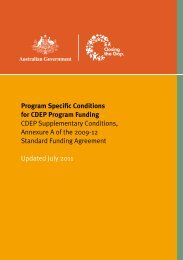



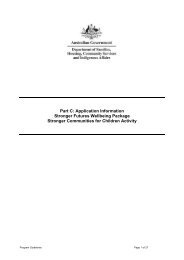

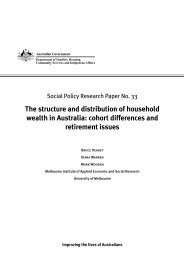
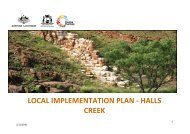
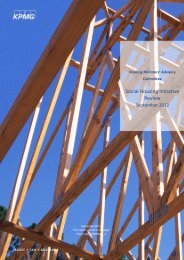

![Land Claim - pdf [278kB] - Department of Families, Housing ...](https://img.yumpu.com/47002639/1/184x260/land-claim-pdf-278kb-department-of-families-housing-.jpg?quality=85)

![Borroloola Land Claim - pdf [299kB] - Department of Families ...](https://img.yumpu.com/46103973/1/184x260/borroloola-land-claim-pdf-299kb-department-of-families-.jpg?quality=85)